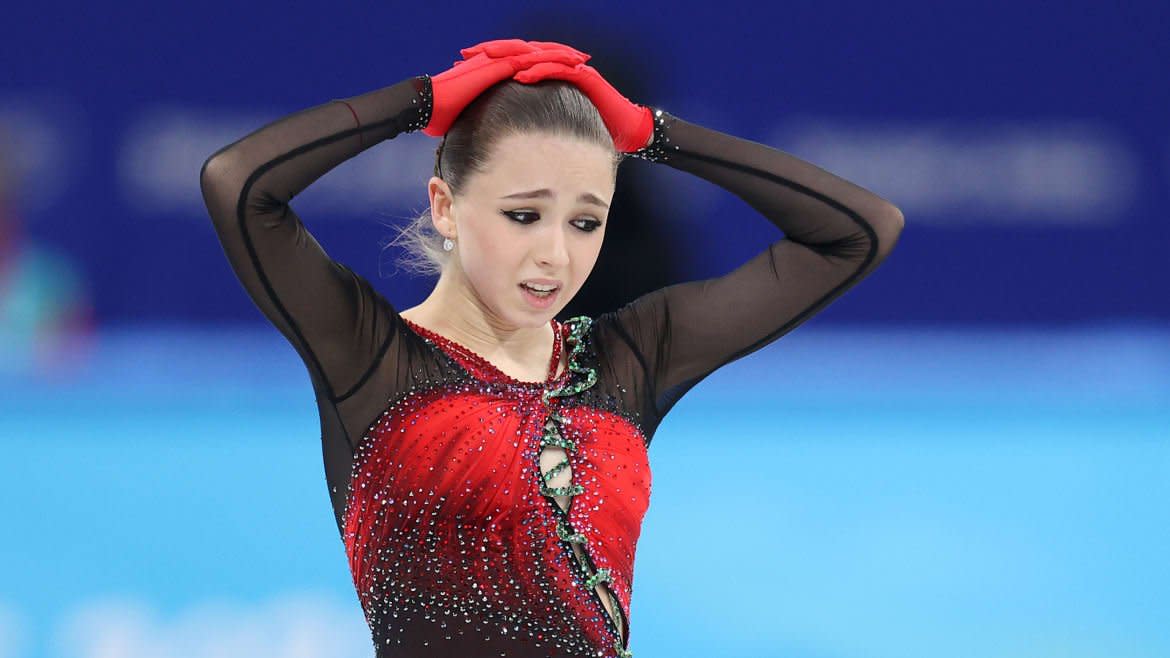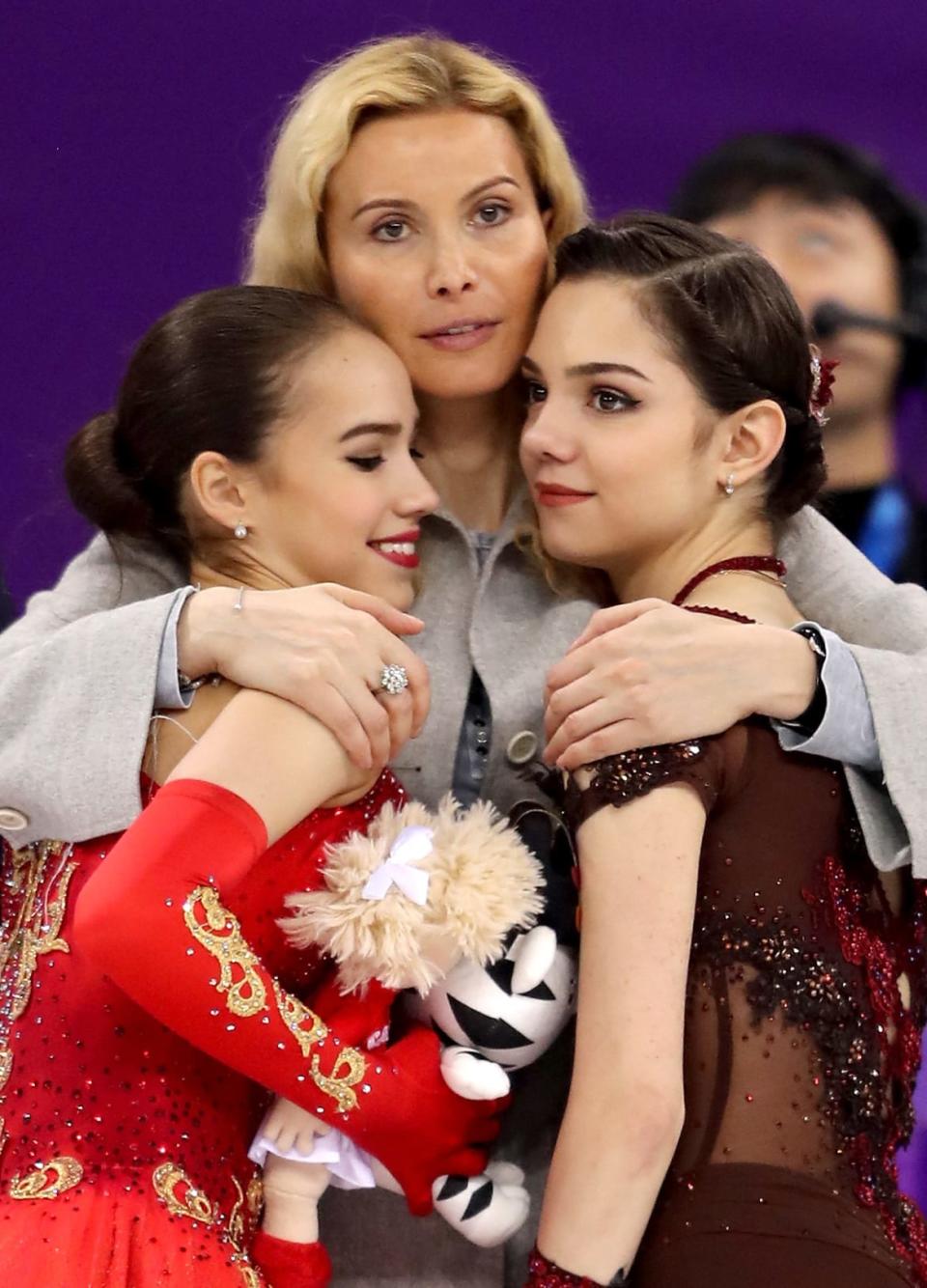Is There a Drug Secret at Skating’s Top Teen Talent Factory?

- Oops!Something went wrong.Please try again later.
- Oops!Something went wrong.Please try again later.
- Oops!Something went wrong.Please try again later.
- Oops!Something went wrong.Please try again later.
Eteri Tutberidze is a survivor. That’s a fact: It’s literally written in granite at the memorial to the Oklahoma City bombing, where her name is one of 600 etched into the Survivor Wall.
But can the Russian figure skating coach, who has become the most powerful woman in her sport over the past decade, walk away unscathed from the dispute over a failed drug test that has rocked the Beijing Winter Olympics?
From her talent factory at the Sambo 70 skating club in Moscow, Tutberidze, 47, has produced a succession of bright young stars claiming Olympic and world titles, girls like Yulia Lipnitskaya, Evegenia Medvedeva, and Alina Zagitova.
All have burned very brightly, at a very young age, and then gone out, their careers ending prematurely in what’s become known in the sport as the “Tutberidze expiration date.”
Tutberidze’s latest star—perhaps her brightest yet—is Kamila Valieva, the 15-year-old who became the first woman to land quad jumps in Olympic competition as she led Russia to victory in the team event on Monday. Her performance marked her out as the clear favorite for next week’s individual contest in Beijing, until news emerged of a failed drug test that could see her barred from competing.
Teen Skating Sensation Named at Center of Russian Doping Fight at Beijing Olympics
The Russian skaters are still waiting to collect their gold medals while Olympic bosses decide who to blame and what punishment they should face. News reports from Moscow say that Valieva tested positive for the angina drug trimetazidine—which can be used to boost blood flow and endurance—in an out-of-competition doping control last December.
The situation is complicated, however. Because of her young age, Valieva is considered a “protected person” under the rules of the World Anti-Doping Agency (WADA), which means that she cannot be held responsible for illegal substances in her system, nor even publicly named as having failed a doping test.
But although Valieva herself is likely to get away with a reprimand, whoever gave her the drug in question—if they can be identified—faces a lifetime ban from the sport because of the athlete’s protected status.
There has been no official confirmation of the drug test, and no one has accused Tutberidze or her fellow coaches of administering banned substances. Skating officials went quickly into defensive mode, however, when an up-and-coming skater, Anastasia Shabotova, told her fans in an Instagram Q&A three years ago that doping was the only way to ensure consistent results—and suggested that Tuberidze’s young skaters were all taking drugs. The Russian skating federation said she was talking “nonsense” and the head of the national anti-doping agency said that the 13-year-old should be punished. Shabotova decided soon afterward to switch her allegiance to Ukraine and is part of the Ukrainian team in Beijing.
The new row has focused further attention on the Russian coach and the methods she employs to produce an endless stream of young champions. She famously forces them to repeatedly practice ever more demanding technical moves, watching their weight, and, critics say, ignoring their long-term physical needs.
The first breakout star from Team Tutberidze was Yulia Lipnitskaya, who electrified the Sochi Winter Olympics with her performance in the team event to the soundtrack of Schindler’s List. At the age of 15 years and 249 days, Lipnitskaya became Russia’s youngest Winter Olympic champion; by 17, battling anorexia and persistent injury, she had retired.
Next to burst onto the scene, at the age of 16, was Evgenia Medvedeva, who won back-to-back world championships in 2016 and 2017 and looked set for Olympic glory in 2018—only to finish in silver medal position behind another Tutberidze skater, 15-year-old Alina Zagitova. Neither made the Russian team for Beijing.

Eteri Tutberidze celebrated winning gold and silver at the 2018 Winter Games with her young stars Alina Zagitova and Evgenia Medvedeva .
In media interviews after her victory in Pyeongchang, Zagitova gave a taste of what life is like inside Team Tutberidze, where the girls are weighed every time they go onto the ice for training. Zagitova said she was watching her weight so carefully at the Olympics that she wasn’t even drinking water: “We just rinsed our mouths and spit it all out.”
Unsurprisingly given her success, Tutberidze has many fans in Russia. The former figure skating great Irina Rodnina, who won three Olympic golds between 1972 and 1980, was among those alleging a conspiracy in Beijing. “Our girls have been hunted for a long time, especially for those who train with Eteri Tutberidze,” she told the RIA-Novosti news agency.
But many in the sport have grave misgivings about her methods and her focus on training girls to compete at the highest levels at such a young age.
“Eteri was smart in her approach: She was first to find a method to teach quad jumps to girls, and the method works, but only until age 17. What are skaters supposed to do then?” the French skate choreographer Benoit Richaud told Insider for a recent profile of the coach. “Of course it was ridiculous to think girls can’t do quads, but what about their careers?”
The Insider profile describes how Tutberidze was herself a promising young figure skater, whose career was ended prematurely by injury. She turned instead to ice dancing, signing up for a 36-city U.S. tour with the Russian Ice Ballet. When the funding for that tour dried up, the dancers found themselves holed up at the Oklahoma City YMCA. On April 19, 1995, a white-supremacist terrorist bombed the Alfred P. Murrah Federal Building across the street, killing at least 168 people.
Tutberidze later told how she emerged from the wreckage of the YMCA building clasping just a toothbrush. Her name, spelled Eteri Toutberidze, is now among those listed as official survivors of the atrocity on a memorial made from granite slabs taken from the ruins of the Federal Building.
With her long, bleached curls and determined, unsmiling gaze, Tutberidze is instantly recognizable rinkside at the major championships. And nobody will be watching more closely than her if Valieva, her latest star, is allowed to compete again for the individual gold medal in Beijing.
Get the Daily Beast's biggest scoops and scandals delivered right to your inbox. Sign up now.
Stay informed and gain unlimited access to the Daily Beast's unmatched reporting. Subscribe now.

